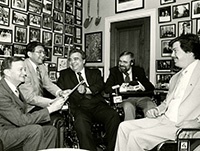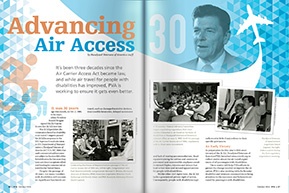It was 30 years ago this month, on Oct. 2, 1986, to be exact, when President Ronald Reagan signed the Air Carrier Access Act (ACAA) into law.
The ACAA prohibits discrimination based on disability in air travel. Congress passed the ACAA in response to the U.S. Supreme Court’s decision in U.S. Department of Transportation v. Paralyzed Veterans of America (477 U.S. 597, 1986) that said commercial airlines were not subject to Section 504 of the Rehabilitation Act because they were not direct recipients of federal funding for commercial air travel in the United States.
Despite the passage of 30 years, too many travelers with disabilities still encounter significant barriers in air travel, such as damaged assistive devices, inaccessible lavatories, delayed assistance and lack of seating accommodations. Inadequate training for airline and contractor personnel and inaccessible airplanes result in missed flights, injuries and delays that lead to lost time and missed opportunities for people with disabilities.
Unlike other civil rights laws, the ACAA lacks a guaranteed private right of action. Consequently, people with disabilities typically receive little if any redress to their specific grievances.
An Early Victory

In preparation for this year’s 30th anniversary of the ACAA, Paralyzed Veterans of America (PVA) launched airaccess30.org to collect stories about the air travel experiences of all passengers with disabilities.
These stories will help PVA’s efforts to garner the change needed to improve the situation. PVA is also working with the broader disability and veterans communities to bring attention to the successes and failures in air travel for passengers with disabilities.
In an early victory for PVA’s advocacy on this issue, the Federal Aviation Administration (FAA) Extension, Safety, and Security Act of 2016 (Public Law 114-190), signed into law on July 15, included two disability-related provisions.
Section 2107 requires that within 270 days of enactment, the Government Accountability Office must submit a report to Congress regarding air carrier personnel and contractor training programs. This includes variations among policies between carriers, how frequently since 2005 the Department of Transportation (DOT) has requested corrective action following review of a training policy and the action taken by the carrier in response. After the report is issued, the DOT must develop and disseminate to air carriers the best practices necessary to improve training policies.
Section 2108 of the law requires the DOT to issue specific pending ACAA regulations within one year of enactment. These regulations include accessible lavatories on single–aisle aircraft, seating accommodations and service animals.
Strengthening Enforcement
PVA is currently serving on a negotiated rulemaking committee that’s seeking to develop a consensus rule on the definition of service animals and accessible lavatories on single-aisle aircraft, as well as accessible in-flight entertainment and communications.
The FAA extension will expire in September 2017. Thus, PVA will have an opportunity in the next Congress to ensure that an FAA reauthorization addresses the problems encountered by people with disabilities in air travel.
Specifically, PVA will seek to strengthen ACAA enforcement by amending the statute to include specific protections and a private right of action. PVA will also advocate to ensure that airplanes are designed to accommodate people with disabilities and that airlines must acquire planes that meet broad accessibility standards.
Access for people with disabilities in air travel must move into the 21st century. PVA wants to ensure stories like National Vice President Charles Brown’s (Missing A Golden Opportunity below) don’t happen and if they do, they’re fixed quickly and correctly.
Otherwise, people with disabilities will be left behind, unable to compete in today’s job market or enjoy the opportunities available to everyone else.
For more information or to share your story of trouble while flying, visit airaccess30.org.



